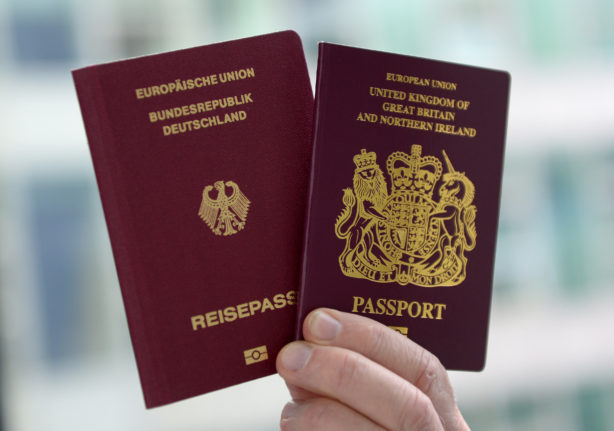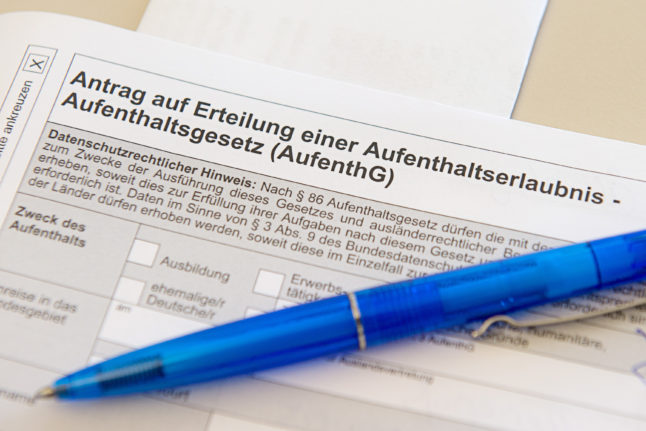Let’s start with the basics. What even is the Aufenthaltsdokument-GB?
The Aufenthaltsdokument-GB is a residence document proving the rights that British people have in Germany under the Withdrawal Agreement.
People covered by the Withdrawal Agreement include British citizens who were living in Germany before December 31st, 2020 – in other words, by the time the UK left the European Economic Area (EEA) and ended free movement after Brexit.
Some other Brits are also covered by the Withdrawal Agreement, even if they weren’t living in Germany on this date. This includes people who had lived in Germany before and had spent less than six months out of the country by the cut-off date, for example.
As mentioned, the card is considered proof that your rights in Germany after Brexit are the same as the ones you had beforehand. In other words, in legal terms, you are an honorary EU citizen while in Germany. That means you have the right to live in the country, take up employment, study, work as a freelancer and claim benefits, among other things.
The same rights are also conferred onto the existing spouses and children of Brits from third-countries (i.e. Canadians married to Brits in Germany) under the Withdrawal Agreement. However, spouses and children must apply for their own documentation separately.
Brits not covered by the Withdrawal Agreement will need to apply to a residence permit in the same way as other third-country nationals if they want to live in Germany.
READ ALSO: EXPLAINED: How can Brits visit or move to Germany post-Brexit?
Is there a limit on how long I can live in Germany with the Aufenthaltsdokument-GB?
No. Under the Withdrawal Agreement, there is no cap on the amount of time you are allowed to stay in the country you were residing in before Brexit. (In this case, Germany.) After Brexit, you continue to have lifelong residency rights – assuming you don’t move away for too long. We’ll cover that side of things in a bit.
There is sometimes a bit of confusion about this, since your new residency card will have an expiry date on it. If your passport expires in more than five years, the expiry date will be the same as the one on your passport. If your passport expires sooner, the card will be valid for five years. The maximum length of time the card can be valid for is 10 years.

This doesn’t mean you’ll suddenly be turfed out of the country once your passport (or the card) expires. However, it does mean you’ll need to apply for both a new passport and/or a new residency card. That’s because the Aufenthaltsdokument-GB should be linked to valid ID in order to prove your identity to the officials, or others such as landlords and potential employers.
READ ALSO:
- Reader question: How can I re-enter Germany without my post-Brexit residence card?
- ‘European again’: How changes to citizenship rules will affect Brits in Germany
How does this differ from ordinary permanent residency?
This is a very good question. On first glance, the two are pretty similar:
- Both grant you lifelong residency rights in Germany (assuming you don’t move away for too long)
- Both give you the freedom to change your employment status, i.e. by becoming a freelancer or changing jobs, without a loss of residency rights
- Both give you the right to study at a German university or undertake vocational training
- Both give you access to social security and health insurance
- Both can confer residency rights onto your immediate family
- Neither grant you freedom of movement rights (i.e. the automatic right to live and work in another EU country)
- Neither grant you the right to vote in Germany
- Neither enable you to apply for EU-only jobs
There are also, however, a couple of important differences:
- With some versions of the Aufenthaltsdokument-GB, you can stay out of the country for longer periods of time without losing your rights in Germany
- Brits covered by the Withdrawal Agreement don’t have to apply for their status like third-country nationals applying for permanent residency do: your rights are assured automatically if you fulfil the conditions, and you simply have to declare your residence in Germany to receive proof of that status via the Aufenthaltsdokument-GB
- People with permanent residency in Germany can sometimes benefit from simplified routes to live, work or study in another EU country. This isn’t automatically the case for Brits covered by the WA.
READ ALSO: Is new court ruling the end for Britons fighting to remain EU citizens?
How long can I live abroad for without losing my residency rights?
That all depends on the type of Aufenthaltsdokument-GB you have and how long you have lived in the country.
If you received your residence document after living in Germany for less than five years, you’ll be able to live abroad for up to six months (or 12 under exceptional circumstances such as leaving for vocational training or study) without any loss of rights.
If you received your residence document after living in Germany for at least five years, you’ll be able to live abroad for up to five years at a time without losing your post-Brexit rights.
OK, but why are people who have been here for five or more years treated differently?
People who’ve lived in Germany for at least five years fulfil the conditions for Daueraufenthalt, which essentially means permanent or long-term residency. This doesn’t affect how long you can stay in Germany, but it does affect how long you can be outside of the country and still keep your rights intact.
Sound confusing? That’s because it is! But the main thing to understand is that if you’ve been here for long enough, you’ll have more flexibility with how long you can live abroad.

What’s more, you don’t have to have to worry about all the other conditions that people have to fulfil to get permanent residency, such as B1 language skills or pension contributions. All you have to do is book an appointment at the Ausländerbehörde (Foreigner’s Office) and bring proof that you’ve lived in Germany for at least five years, alongside any other documents they ask for, such as proof of income.
If you’re thinking of leaving the country for more than six months, make sure you have the right Aufenthaltsdokument-GB that recognises your Daueraufenthalt status. You can check this with the Foreigner’s Office if you’re unsure.
Are there any benefits to getting another residency title instead of the Aufenthaltsdokument-GB?
The short answer is: no. Your status in Germany under the WA is much the same as it was before Brexit. That means that, as well as not needing to apply for any other residency documents, you also aren’t allowed to. For that reason, people who were in receipt of an ordinary permanent residency card before Brexit had to swap it for an Aufenthaltsdokument-GB.
The one key exception is if you are keen to live, study or work in another EU state. As mentioned, EU permanent residency (Daueraufenhalt-EU) offers the holder some simplified routes for working and studying in other member states. That isn’t the case with the Aufenthaltsdokument-GB.
In this case, the Interior Ministry has this to say: “Another, limited possibility for mobility within the EU exists if you meet the requirements for a permit for permanent residence in the EU or for the EU Blue Card. You can also apply for these residence rights intended for third-country nationals if you are eligible under the Withdrawal Agreement.”
If you’re curious about whether you may be eligible for these additional rights, the best thing to do is contact your local Foreigner’s Office and discuss it with them in person.
When it comes to German citizenship, that’s a different question. German citizenship not only gives you genuine lifelong residency rights (regardless of how long you spend abroad), but also gives you numerous other benefits like the ability to vote and enjoy free movement elsewhere in the EU.
For more on the difference between citizenship and permanent residency, check out our explainer below:
EXPLAINED: How German citizenship differs from permanent residency





 Please whitelist us to continue reading.
Please whitelist us to continue reading.
Appreciate this article very much!